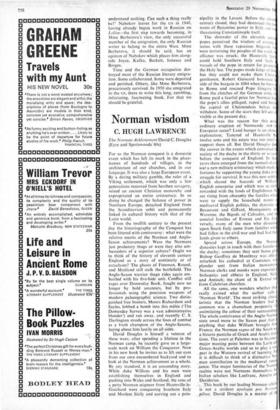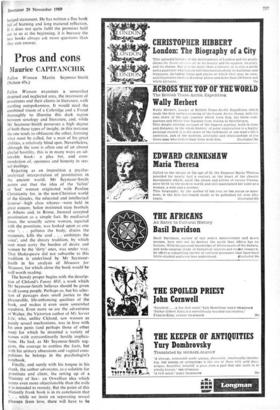Norman wisdom
C. HUGH LAWRENCE
The Norman Achievement David C. Douglas (Eyre and Spotiswoode. 60s) For us the Norman conquest is a domestic event which has left its mark in the place- names of hundreds of villages, in the architecture of our churches, and in our language. It was also a large European event. By a daring military gamble, the ruler of a Viking settlement, which was only a few generations removed from-heathen savagery, seized an ancient Christian monarchy and expropriated an entire aristocracy. In so doing he changed the balance of power in Northern Europe, detached England from the Scandinavian orbit and permanently linked its cultural history with that of the Latin world.
From the twelfth century to the present day the historiography of the Conquest has been littered with controversy: what were the relative merits of the Norman and Anglo- Saxon achievements? Were the Normans just predatory thugs or were they also am- bassadors of a superior culture? Ought we to think of the history of eleventh century England as a story of continuity or of cataclysm? The ghosts of Freeman, Round, and Maitland still stalk the battlefield. The Anglo-Saxon warrior thegn rides again em- battled with his five-hide unit. Conflict still rages over Domesday Book, fought now no longer by bold amateurs, but by pro- fessionals using the precision weapons of modern palaeographic science. Two distin- guished free booters, Messrs Richardson and Sayles, lobbed a bomb into this mêlée ('The Domesday Survey was a vast administrative blunder') and ran away, and recently C. S. Darlington strode across the lines of combat as a fresh champion of the Anglo-Saxons, laying about him lustily on all sides.
David Douglas is himself a veteran of these wars; after spending a lifetime in the Norman camp, he recently gave us a large- scale work on William the Conqueror. Now in his new book he invites us to lift our eyes from our own encumbered backyard and to look at the Norman achievement as a whole.
By any standard, it is an astounding story. While duke William and his men were establishing themselves in England and pushing into Wales and Scotland, the sons of a petty Norman seigneur from Hauteville-le- Guichard were conquering Southern Italy and Moslem Sicily and carving out a prin-
cipality in the Levant. Before the eleve century closed, they had destroyed the re nants of Byzantine power in Italy and ix threatening Constantinople itself.
The shrewder of the eleventh cent popes perceived the wisdom of coming terms with these rapacious brigands u were terrorising the peoples of the south. alliance was struck; the Hauteville fa could hold Southern Italy and Sicily vassals of the pope in return for protecti the Holy See. The popes made kings of the but they could not make them Christ gentlemen. Robert Guiscard honoured side of the bargain in 1084 when he burst to Rome and rescued Pope Gregory 1r from the clutches of the German army, b Rome paid a fearful price for Norman he the pope's allies pillaged, raped and bu the capital of Christendom before th withdrew. Some of the scars they left are s visible at the present day.
What was the reason for this ext ordinary eruption of Normandy inte t European scene? Land hunger is an obvit, explanation; Tancred of Hauteville twelve sons and his estate was too small support them all. But David Douglas the answer in the events which convulsed society of the duchy in the thirty or so yea before the conquest of England. In th years there emerged from the turmoil of ci war a new military aristocracy which made i fortunes by supporting the young duke in struggle for survival. It was this new nobil which shared the hazards of William English enterprise and which was so rich rewarded with the lands of Englishmen. Vi see rising from obscurity the families whi were to supply the household names mediaeval English politics, the dynasties Beaumont and Giffard, Montgomery a Warenne, the Bigods of Calvados, and I comital families of Evreux and Eu. Co versely, many of the men who descend upon South Italy came from families wh had fallen in the civil war and had had the lands given to others.
Spread across Europe, the Norm dynasties kept in touch with their families the duchy; sometimes they sent home gif Bishop Geoffrey de Montbray was able refurbish his cathedral at Coutances wl plunder sent from Italian monasten Norman clerks and monks were exported bishoprics and abbeys in England, Sicil and Antioch; the chant of St Evroul r from Calabrian churches.
All the same, one wonders whether the really existed what the author calls `Norman World'. The most striking cha teristic that the Norman leaders had common was a chameleon propensity f assimilating the colour of their surroundin The whole contrivance of the Anglo-Norm state owed more to the Saxon past than I anything that duke William brought fro France; the Norman regno of the South %; a bizarre pastiche of Greek and Arabic tra tions. The court at Palermo was to become major meeting point between the Latin a Greco-Arabic worlds and so to play a V part in the Western revival of learning. it is difficult to think of a distinctive No , man contribution to the mediaeval rena -lance. The major luminaries of the Norm realms were not Normans themselves, Italian scholars like Lanfranc, Anselm a Desiderius.
This book by our leading Norman scho is not a strident apologia pro Nom pibus; David Douglas is a master of
hedged statement. He has written a fine book full of learning and long matured reflection. If it does not quite fulfil the promises held out to us at the beginning, it is because the best books always ask more questions than they can answer.











































 Previous page
Previous page